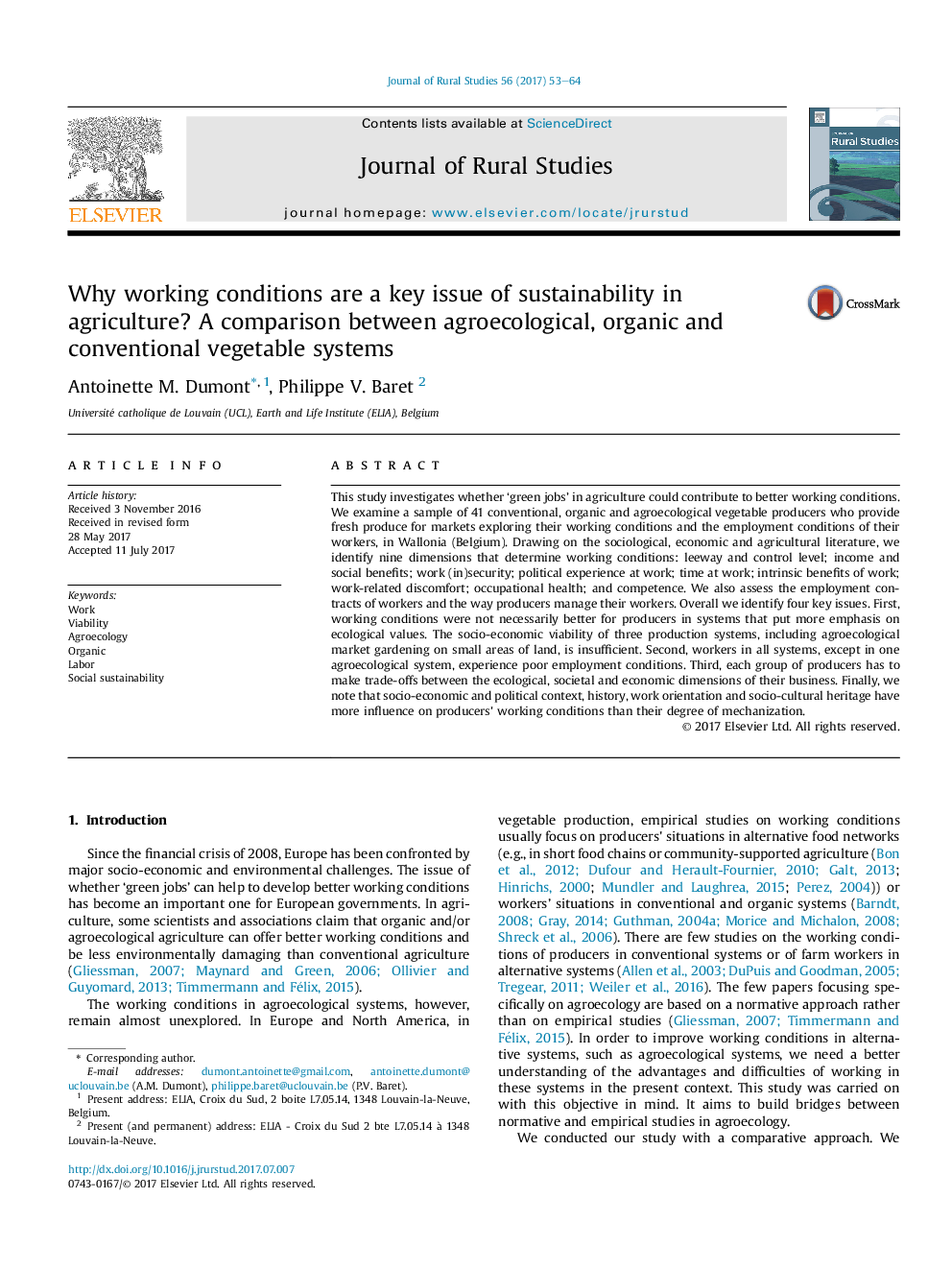| کد مقاله | کد نشریه | سال انتشار | مقاله انگلیسی | نسخه تمام متن |
|---|---|---|---|---|
| 4759921 | 1421775 | 2017 | 12 صفحه PDF | دانلود رایگان |
عنوان انگلیسی مقاله ISI
Why working conditions are a key issue of sustainability in agriculture? A comparison between agroecological, organic and conventional vegetable systems
ترجمه فارسی عنوان
چرا شرایط کار یک موضوع کلیدی پایداری در کشاورزی است؟ مقایسه سیستم های گیاهی زراعی، زراعی و طبیعی
دانلود مقاله + سفارش ترجمه
دانلود مقاله ISI انگلیسی
رایگان برای ایرانیان
کلمات کلیدی
کار، حیاتی، کشاورزی ارگانیک، کار، پایداری اجتماعی،
ترجمه چکیده
این مطالعه به بررسی اینکه آیا شغل سبز در کشاورزی می تواند به شرایط کار بهتر کمک کند. ما نمونه ای از 41 تولید کننده سبزیجات معمولی، آلی و کشاورزی را بررسی می کنیم که در والونیا (بلژیک) محصولات تازه ای را برای بازارهایی که شرایط کاری و شرایط اشتغال کارگرانشان را ارائه می دهند، عرضه می کنند. با توجه به ادبیات جامعه شناختی، اقتصادی و کشاورزی، ما 9 ابعاد را تعیین می کنیم که شرایط کاری را مشخص می کنند: رفاه و کنترل؛ درآمد و مزایای اجتماعی؛ کار (در) امنیت؛ تجربه سیاسی در کار؛ زمان در محل کار؛ منافع درونی کار؛ ناراحتی مربوط به کار؛ سلامت شغلی؛ و شایستگی ما همچنین قراردادهای کاری کارگران و نحوه تولید کارگران خود را ارزیابی می کنیم. به طور کلی چهار موضوع اصلی را شناسایی می کنیم. اول، شرایط کار برای تولید کنندگان در سیستم هایی که بر ارزش های اکولوژیکی تأکید بیشتری دارند، لزوما بهتر از آن نیست. حیاتی اقتصادی و اقتصادی سه سیستم تولید، از جمله باغداری باغ وحش در مناطق کوچک زمین، کافی نیست. دوم، کارگران در تمامی سیستم ها، به جز در یک سیستم کشاورزی، شرایط اشتغال کمتری را تجربه می کنند. سوم، هر گروه از تولید کنندگان باید میان معیارهای زیست محیطی، اجتماعی و اقتصادی کسب و کار خود را درگیر کنند. در نهایت، ما یادآور می شویم که وضعیت اجتماعی-اقتصادی و سیاسی، تاریخ، جهت گیری کار و میراث فرهنگی-اجتماعی، تأثیر بیشتری بر شرایط کار تولیدی نسبت به میزان مکانیزاسیون آنها دارد.
موضوعات مرتبط
علوم زیستی و بیوفناوری
علوم کشاورزی و بیولوژیک
جنگلداری
چکیده انگلیسی
This study investigates whether 'green jobs' in agriculture could contribute to better working conditions. We examine a sample of 41 conventional, organic and agroecological vegetable producers who provide fresh produce for markets exploring their working conditions and the employment conditions of their workers, in Wallonia (Belgium). Drawing on the sociological, economic and agricultural literature, we identify nine dimensions that determine working conditions: leeway and control level; income and social benefits; work (in)security; political experience at work; time at work; intrinsic benefits of work; work-related discomfort; occupational health; and competence. We also assess the employment contracts of workers and the way producers manage their workers. Overall we identify four key issues. First, working conditions were not necessarily better for producers in systems that put more emphasis on ecological values. The socio-economic viability of three production systems, including agroecological market gardening on small areas of land, is insufficient. Second, workers in all systems, except in one agroecological system, experience poor employment conditions. Third, each group of producers has to make trade-offs between the ecological, societal and economic dimensions of their business. Finally, we note that socio-economic and political context, history, work orientation and socio-cultural heritage have more influence on producers' working conditions than their degree of mechanization.
ناشر
Database: Elsevier - ScienceDirect (ساینس دایرکت)
Journal: Journal of Rural Studies - Volume 56, November 2017, Pages 53-64
Journal: Journal of Rural Studies - Volume 56, November 2017, Pages 53-64
نویسندگان
Antoinette M. Dumont, Philippe V. Baret,
